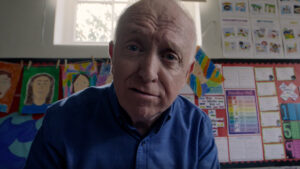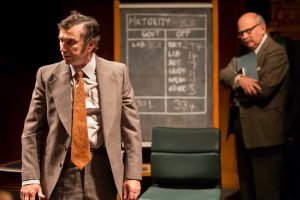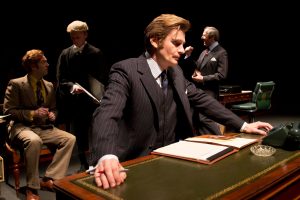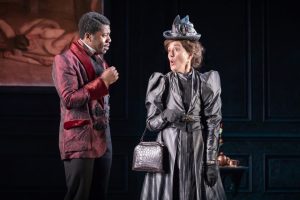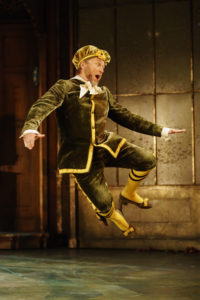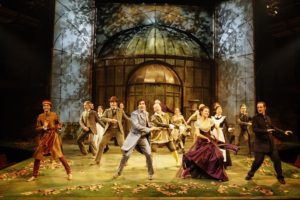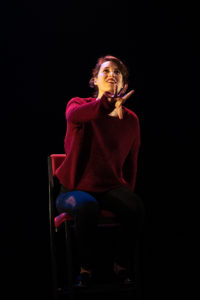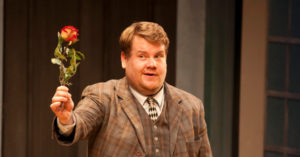Victoria Hamilton blooms in Mike Bartlett’s play about loss
★★★★
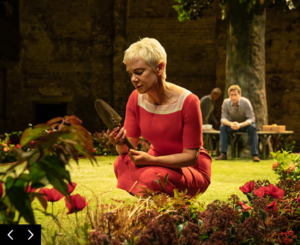
Sometimes you watch the first act of a play and it’s just the setup and you really want to get it over with so you can move on to how it’s all going to work out. Not so with Mike Bartlett’s Albion, directed by Rupert Goold at the Almeida Theatre, which is currently available as a live recording on BBC iPlayer. The first act is captivating and what follows, while good, never lives up to the promise.
Audrey has bought a house she knew as a child. It had a historic garden and she plans to renovate it. No matter that this involves uprooting her daughter, neglecting her business, upsetting the local community who have become used to using the huge outdoor space for their annual events.
It’s a good script but what you’re riveted by is Victoria Hamilton’s performance. From the start, she grabs you by the lapels, then she puts you down and walks away, then she picks you again. She is mesmerising as she paces back and forth and spits out her staccato sentences, like a neurotic sergeant major. For example, when she is pouring tea and says: ‘Let me be mother…since I am…’ followed by a false, stuttering laugh.
This is the sort of intimate theatre that works really well in a live recording. The Almeida is a small theatre and the cast occupy a three-sided stage. It’s like an oval island surrounded by the audience. Actually, although an island might symbolise its isolation from the rest of the world, it is in fact a garden with a solid tree at one end, giving a sense of history. The actors don’t have to shout and the cameras close in on a face much as you would if you were lucky enough to be sitting in one of the seats.
For me, nothing lived up to that first act. There’s plenty going on with many developments involving the other characters but they felt tacked on, no matter how good the acting was. Not so much multi-layered, as laid on thick. And the ending was way too melodramatic.
What I loved throughout the whole play was the dominating character of Audrey and the way Victoria Hamilton blooms as the wishful gardener. Grief has consumed her and the only way she can cope is to reject everyone and everything in favour of a retreat into an imagined golden age.
She has lost her soldier son in what she sees as defending his country but what is referred to a one point as a ‘folly’. As a way of honouring him, she is determined to recreate the original garden, even though it is now anachronistic. It’s pointed out that the climate has changed- and that ‘climate’ may refer to more than growing conditions, because there is an allegory here for the state of England and how we as a nation are coping with the loss of mythical past glories and with the need to move on.
Audrey wants to return to a bygone age but only within the boundaries of her world. So, she doesn’t care that she is trampling on the traditions of the local people; and she hires the more efficient Polish cleaner (and sacks the local woman who has done the job for years. It is fascinating, shocking even to see the insensitivity that can come from single-mindedness, and her gradual but inevitable disintegration.
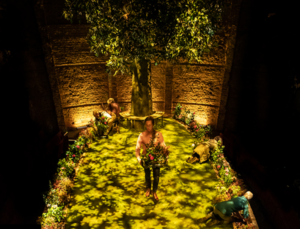
It’s also fascinating to see the garden change as flowers grow through the four acts, each of which is a different season, culminating with the ‘fall’. It’s a great design by Miriam Buether.
I glossed over the other characters earlier but that doesn’t mean I don’t think they were acted well. Audrey’s daughter Zara is played by Daisy Edgar-Jones, who recently made a breakthrough to stardom with her role in TV’s Normal People. She is perfect as a troubled twenty something. Helen Schlesinger makes you feel the pain as Katherine, a successful but shy novelist, forced to make a hard choice between a thirty year friendship and a rare opportunity for love.
In a play that is more amusing than funny, Nicholas Rowe as Audrey’s devoted husband Paul got the most laughs as a man so proudly laid back that he was almost horizontal.
It’s hard not to compare Albion with Chekhov’s The Cherry Orchard. Unfortrunately, on every count, this play comes out worse. Chekhov’s second half doesn’t peter out, his ending feels real and even his minor characters have depth. So best not go there, better to simply enjoy Albion as a good if not great play with a mother of a leading role that, in future productions, actors will queue up to play.
For me, one of the tests of watching theatre at home is whether I wish I’d seen it in the theatre. In Albion’s case, despite some flaws, I would have loved to have been there. Especially to see that outstanding performance by Victoria Hamilton.
The live recording of Mike Bartlett’s Albion is currently available on BBC i-Player.

